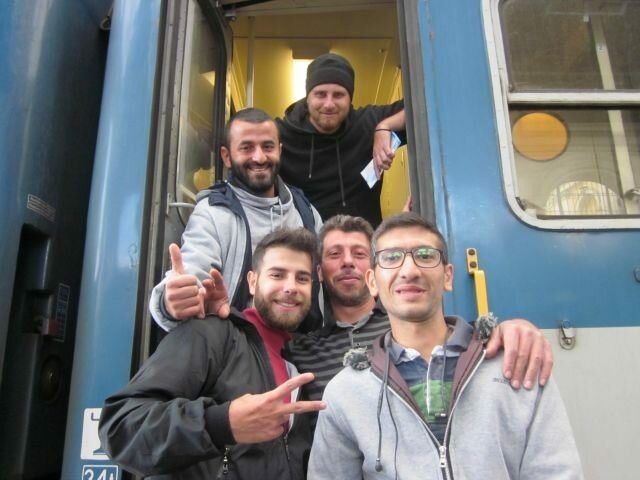Hungary has become the newest flashpoint as thousands of migrants try to get to Western Europe, particularly Germany, which has said it will no longer deport Syrian refugees and will take in 800,000 people this year.
A spokesman for the interior ministry in Vienna told NBC News that the Austrian government continues to see the flow of refugees and migrants from Hungary as an “emergency situation” and said Austria “will not use police power to prevent those who are seeking protection and who are desperate from crossing its border“.
Austria and Germany have thrown open their borders to thousands of exhausted migrants.
However, Hungarian police spokeswoman Viktoria Csiszer-Kovacs said anyone taking refugees and migrants across the border was breaking the law.
Hundreds broke out of an overcrowded camp on the border with Serbia on Friday; others escaped a stranded train, sprinting away from riot police down railway tracks, while more still took to the highway by foot.
Munich’s mayor, Dieter Reiter, said on Sunday that he was not anxious about the numbers arriving in the city – only “how can we give them a feeling that they are safe here”.
There is little sign of a co-ordinated European Union response to the crisis, despite more than 350,000 migrants having crossed the EU’s borders in 2015 alone.
Hungary’s main train station in Keleti is now closed to Western European routes, but that hasn’t stopped refugees and migrants from walking 110 miles to the Austrian border in order to catch trains to Germany. Reports suggest that Austria will receive some 10,000 people by the end of Saturday. Austria had said it had agreed with Germany that it would allow the migrants access.
Hungarian officials have portrayed the crisis as a defence of Europe’s prosperity, identity and “Christian values” against an influx of mainly Muslim refugees.
Hungary insisted the bus rides were a one-off, even as hundreds more migrants assembled in Budapest on Saturday, part of a seemingly relentless surge through the Balkan peninsula from Turkey and Greece.
The mass migration to Germany comes after Hungary relaxed its attempts to stop the progress of migrants, which had created risky bottlenecks around the capital’s main train station.
At a high-level meeting that lasted more than five hours, leaders from Chancellor Angela Merkel’s governing coalition also agreed on a series of other measures, such as speeding up asylum procedures and facilitating the construction of asylum shelters.
Only a few dozen, however, elected to seek asylum in Austria after being transported by bus from Hungary, while the rest continued on to Germany.
“Transit zones” would be created along the border, where asylum seekers would be held until their applications are processed.
Around 7,000 arrived in Munich on trains from Austria on Saturday with another 5,000 expected yesterday.
Refugees have been offered help and support in Hungary, but many are relieved to leave a country which has not made them welcome.
